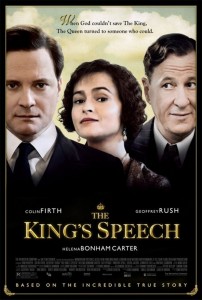“If I am King, where is my power? Can I declare war, form a government, levy a tax? No! And yet I am the seat of all authority because they think that when I speak, I speak for them.”—— King George VI
Clearly not expected in a classic film website—probably in time, yes—but, more than usual, I felt inspired by, and prompted to recommend, a current film. So few good films are being made these days that when, now, a great one comes along—wow! The King’s Speech is such a film, centered around natural, well-written dialogue, about mature relationships among real, historical individuals and keyed to the essence of history itself, relatively recent history at that. Most important, at least to me, it’s about friendship, as are such diverse films as The Untouchables, Enchanted April, The Shawshank Redemption and Driving Miss Daisy, for whatever else these movies might be “about.”
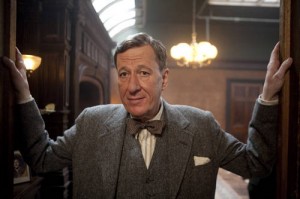 In The King’s Speech it’s the growing rapport between a commoner, an uncertified speech therapist, Lionel Logue (Geoffrey Rush), and a stammerer (Colin Firth), then Duke of York, full name Albert Frederick Arthur George. A man who did not want to be king, the Duke was crowned George VI, May 12, 1937, ending, as he wrote in his diary, “the awful and ghastly suspense,” when it became apparent his brother, Edward VIII, would abdicate “for the woman he loved.”
In The King’s Speech it’s the growing rapport between a commoner, an uncertified speech therapist, Lionel Logue (Geoffrey Rush), and a stammerer (Colin Firth), then Duke of York, full name Albert Frederick Arthur George. A man who did not want to be king, the Duke was crowned George VI, May 12, 1937, ending, as he wrote in his diary, “the awful and ghastly suspense,” when it became apparent his brother, Edward VIII, would abdicate “for the woman he loved.”
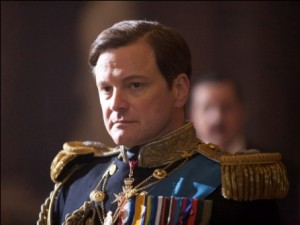 The standard photograph, seen so often in advertisements and reviews of the film, is that of Firth as George VI, in a resolute, distant stare, his uniform weighed down with medals, dazzling ribbons, a sash, gigantic epaulettes, a contrastingly subtle necklace and a tangle of shoulder cords. He only appears once or twice in this regalia. Don’t be put off. The movie is hardly so stolid, but alive with vibrant, flesh-and-blood characters and their contacts with each other—and with the outside world, whatever occasional liberties might sometimes be taken with historical fact.
The standard photograph, seen so often in advertisements and reviews of the film, is that of Firth as George VI, in a resolute, distant stare, his uniform weighed down with medals, dazzling ribbons, a sash, gigantic epaulettes, a contrastingly subtle necklace and a tangle of shoulder cords. He only appears once or twice in this regalia. Don’t be put off. The movie is hardly so stolid, but alive with vibrant, flesh-and-blood characters and their contacts with each other—and with the outside world, whatever occasional liberties might sometimes be taken with historical fact.
The cast is wonderfully British—surprising how many of the stars were born in London alone—which usually means, as it does in this case, great ensemble unanimity. Many of them theater trained, they are willing to stifle their egos for the benefit of the whole cast, as illustrated in so many of the BBC television productions.
At their first meeting, Logue asks how the Duke of York wishes to be addressed. When he replies “your royal highness,” Logue suggests “Bertie,” the name used only among family, as the Duke informs Logue. Very soon, the two share calisthenics, cheek wobbling, strolls in public parks and Lionel is rolling his patient on the floor. And later, alone in Logue’s drab apartment, the two share even more—intimate teas and personal secrets. Apart from the obviously private man, careful screen attention is given to the devoted husband and family man.
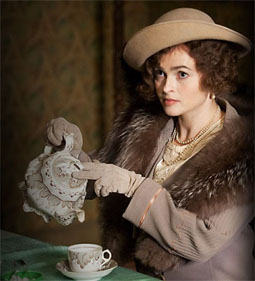 Helena Bonham Carter (the Duke’s wife Elizabeth) perfectly conveys the unassuming, yet strong demeanor of the real person, entering Logue’s simple apartment with humble dignity, refusing politely a dinner invitation, as if, at another time, she might have accepted. She is a stalwart supporter of her husband in all things, certainly in the struggle with his speech problem, although perhaps this aspect could have been expanded in the film. Later, this real person of kindly guise would affectionately be known as the Queen Mother and die in 2002, age 101.
Helena Bonham Carter (the Duke’s wife Elizabeth) perfectly conveys the unassuming, yet strong demeanor of the real person, entering Logue’s simple apartment with humble dignity, refusing politely a dinner invitation, as if, at another time, she might have accepted. She is a stalwart supporter of her husband in all things, certainly in the struggle with his speech problem, although perhaps this aspect could have been expanded in the film. Later, this real person of kindly guise would affectionately be known as the Queen Mother and die in 2002, age 101.
Bertie’s father, George V, is crustily played by Michael Gambon, most notably from the Harry Potter films, forecasting rather accurately the future for his son the Prince of Wales, later Edward VIII: “After I am dead, the boy will ruin himself in twelve months.” As history would prove, he accomplished that in considerably less time, plus, ahead of him, the empty, vagabond life as the Duke of Windsor.
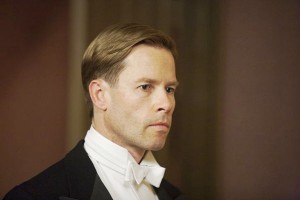 Properly so, Edward VIII (Guy Pearce) comes off as a dull, insensitive mediocrity concerned mainly with enjoying life and doting over his equally shallow paramour, Wallis Simpson (Eve Best). Both actors convey an unattractiveness, both physically and in their individual personas. (The pair’s superficiality—and, more, their malevolence—is better shown in Any Human Heart, which premiered on PBS in February, 2011. Although a less successful British production, with overtones of soap opera and predictable situations, Tom Hollander looks more like the duke than Pearce, and Gillian Anderson is a properly bitchy duchess.)
Properly so, Edward VIII (Guy Pearce) comes off as a dull, insensitive mediocrity concerned mainly with enjoying life and doting over his equally shallow paramour, Wallis Simpson (Eve Best). Both actors convey an unattractiveness, both physically and in their individual personas. (The pair’s superficiality—and, more, their malevolence—is better shown in Any Human Heart, which premiered on PBS in February, 2011. Although a less successful British production, with overtones of soap opera and predictable situations, Tom Hollander looks more like the duke than Pearce, and Gillian Anderson is a properly bitchy duchess.)
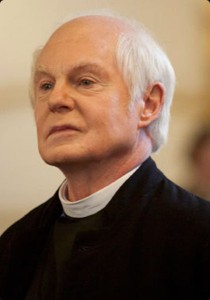 As Archbishop Lang, Derek Jacobi, despite his usual stage presence, plays third fiddle to Lionel and Bertie when they rehearse the king’s speech at Westminster Abbey. Bertie admonishes Lionel for sitting in Saint Edward’s chair, the ancient seat used in most British coronations since 1308. “Why not?” Lionel says, “It’s a chair. Why should I waste my time listening to you?” “Because,” the King replies, “I have a voice.” Then Lionel observes solemnly, “Yes, you do.”
As Archbishop Lang, Derek Jacobi, despite his usual stage presence, plays third fiddle to Lionel and Bertie when they rehearse the king’s speech at Westminster Abbey. Bertie admonishes Lionel for sitting in Saint Edward’s chair, the ancient seat used in most British coronations since 1308. “Why not?” Lionel says, “It’s a chair. Why should I waste my time listening to you?” “Because,” the King replies, “I have a voice.” Then Lionel observes solemnly, “Yes, you do.”
Claire Bloom, seen more or less in passing shots, is not quite tall enough nor stately enough to be Queen Mary, wife/widow of George V. Having seen, in the process of this writing, Bloom in Look Back in Anger of some fifty years ago, I was reminded, perhaps for the first time, of her resemblance to the young Jean Simmons, the eyes especially.
